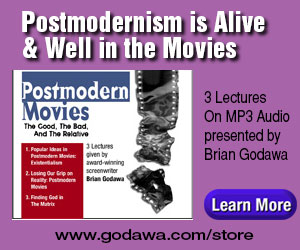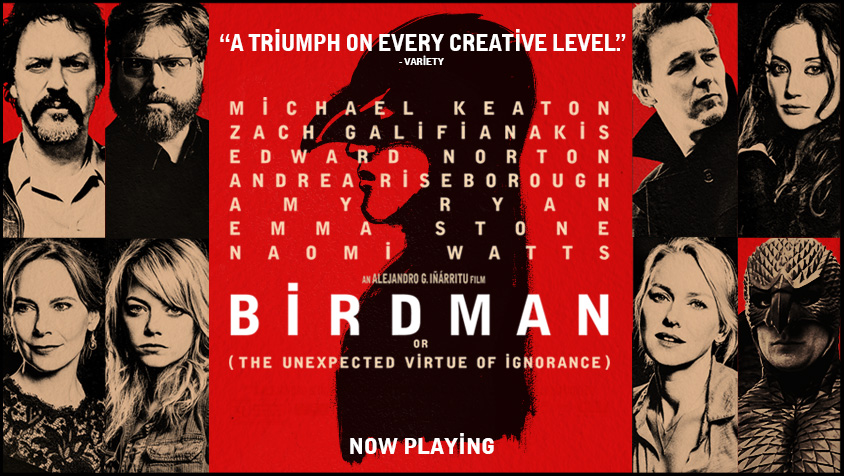A washed up Hollywood action film star on the verge of opening a Broadway play wrestles with family and career problems while facing his own lack of significance and a meaningful life — and a mental breakdown.
Michael Keaton may very well win the Oscar for this one. He plays Riggin, an old ex-action movie star, made famous for playing the movie superhero Birdman. Now over the hill, he seeks to do something “legitimate” by producing and starring in a serious minded Broadway play. As he prepares for opening day, we follow him through the mess of a life he has made with his ex-wife, daughter, agent, and various other minor players in his entertainment celebrity life.
This movie is captivating and thought-provoking on several levels. From a visual or cinematic perspective, it manages to maintain a high paced energy and intimate point of view through an amazing artistic technique of appearing to be one continuous camera take following Riggin and others in their frenetic preparation and interaction preparing for the opening. I remember watching the old Hitchcock movie, Rope, that shot the entire movie in three blended takes. But that movie was shot in one room. This movie follows Riggin and others around the theater and even on a superhero flying sequence through New York.
That’s right. You heard, “a superhero flying sequence through New York.” Because one of the other brilliant elements of this story is its depiction of the mental breakdown of a celebrity actor who is facing his own existential angst of meaninglessness through loss of adoring fan worship. His alter ego, a figment of himself as Birdman, taunts him in his mind with a confusing mixture of stark honesty and muttered self-delusion that pushes him to the edge of his sanity. Keaton’s past as the original star of Batman, makes this intensely personal tragedy all the more authentic and perfectly casted.
But this is all just a microcosm of the world of entertainment that seeks its significance in being loved and in the praise of others, which is really a microcosm of humanity. As the Edward Norton character says, “popularity is the slutty cousin of prestige.” And the irony is that neither popularity with the masses nor prestige with the elite brings ultimate satisfaction or significance in this endless pursuit of acceptance.
 Which leads us to the next profound aspect of the film: It’s rich exploration of the philosophical debates of populism vs. the elite, Hollywood movies vs. Broadway plays, art vs. commerce, artist vs. critic, low brow entertainment vs. high brow “art,” creator vs. audience, and real life vs. fantasy. The movie manages to navigate all these issues with a fluid finesse and honesty that rings both true and ironic, as the movie itself is a Hollywood movie about Broadway that is pretentious yet entertaining, and has actors playing actors musing about their plays within plays being “real” instead of pretentious acting. Norton’s turn as the famous actor seeking authenticity and “truth” in their acting is another Oscar worthy performance. But this is not merely an abstract philosophical debate, it is rather a thoughtful depiction of what we live and breathe in as a culture of entertainment.
Which leads us to the next profound aspect of the film: It’s rich exploration of the philosophical debates of populism vs. the elite, Hollywood movies vs. Broadway plays, art vs. commerce, artist vs. critic, low brow entertainment vs. high brow “art,” creator vs. audience, and real life vs. fantasy. The movie manages to navigate all these issues with a fluid finesse and honesty that rings both true and ironic, as the movie itself is a Hollywood movie about Broadway that is pretentious yet entertaining, and has actors playing actors musing about their plays within plays being “real” instead of pretentious acting. Norton’s turn as the famous actor seeking authenticity and “truth” in their acting is another Oscar worthy performance. But this is not merely an abstract philosophical debate, it is rather a thoughtful depiction of what we live and breathe in as a culture of entertainment.
In what was for me, one of two of the best scenes of the movie, Michael Keaton argues with a New York Times play critic who tells him in advance she is going to destroy him in her review sight unseen. She does so, because despite the fact that he is trying to do something of significance, she despises his past as a vapid movie star of action movies. In this moment of irony, we can see that her venomous contempt for the actor’s popularity, her pride of elite status, and her reckless disregard for authenticity, place her in less a position of meaning and significance than the desperate man she attacks. In fact, Riggin has the last word in the argument when he declares out of his own broken transparency, “It costs you nothing [to destroy]. I risk everything [to create].”
SPOILER ALERT
Riggin’s mental breakdown leads him to a drastic solution of trying to kill himself with a real gunshot onstage in the play, the ultimate twisted satisfaction for an audience that both sucks his blood and gives him his life. He fails, and ends up in the hospital having plastic surgery on his nose that makes him look strangely like Birdman. And of course, the audience loved it. Ah, he is becoming Birdman in his delusions and his audience is helping him.
END OF SPOILER ALERT
In what was the second fantastic scene of the movie for me (really, there are more than two), Emma Stone, in another Oscar worthy performance as Riggin’s daughter, Sam, launches into a emotionally moving psychoanalytic rant that her father cannot handle the fact that he is insignificant and his life has no meaning.
And here is where the movie breaks down and ends in an unsatisfying conclusion. I have great respect for the filmmaker’s journey and attempt to explore the search for significance and transcendence that we all embark on. The problem is that from its own secular worldview, there can be no significance or meaning because there is no transcendence to life in this view. All there is at the end is death and the void of non-existence. Our self-made meaning is the cruelest self delusion of all because there is no true meaning. Self-made meaning is a fairy tale fantasy that is false. And we are all fools.
At least in the secular worldview without a transcendent God.
So the movie ends with Riggin taking an existential leap of faith into the void, having fully embraced the Birdman delusion. But his daughter’s positive reaction to his fate is much like the well meaning destructive attitude of an enabler to mental illness. She smiles that he is “flying” in what to me as a viewer is a very false happy ending. For in that very “happy ending,” all the authenticity, all the transparent honesty of the film completely falls flat and fails to honestly face the consequences of its own ideas. It fails to satisfy because of its own self-delusion. I felt as if I watched a ninety-minute profound critique of self-delusion that ends up embracing a delusion that invalidates the previous ninety minutes. Unsatisfying to say the least.
Birdman is a profound search for significance that fails to achieve the transcendence that the storyteller and audience are dying for.
But I did enjoy the conversation.



4 comments on “OSCAR WATCH • Birdman: Profound Search for Transcendence, Finds None.”
Sounds like an interesting film, but I think your review is even more interesting. Thank you!
The next step after Nietzsche’s Madman, in a late post-Christian Hollywood, when the atheist begins to actually believe, “God is dead.”
It is interesting indeed that he played Batman, I find the more recent Batman trilogy to express incredible hopelessness and despair that is not so far removed from the theme that is pursued here. The Dark Knight seemed to accent it in a way that inspired me to write my own blog about it.
Your review helps me enjoy the film even more. However, as a drummer, I must say that I very much enjoyed the soundtrack.
Comments are closed.